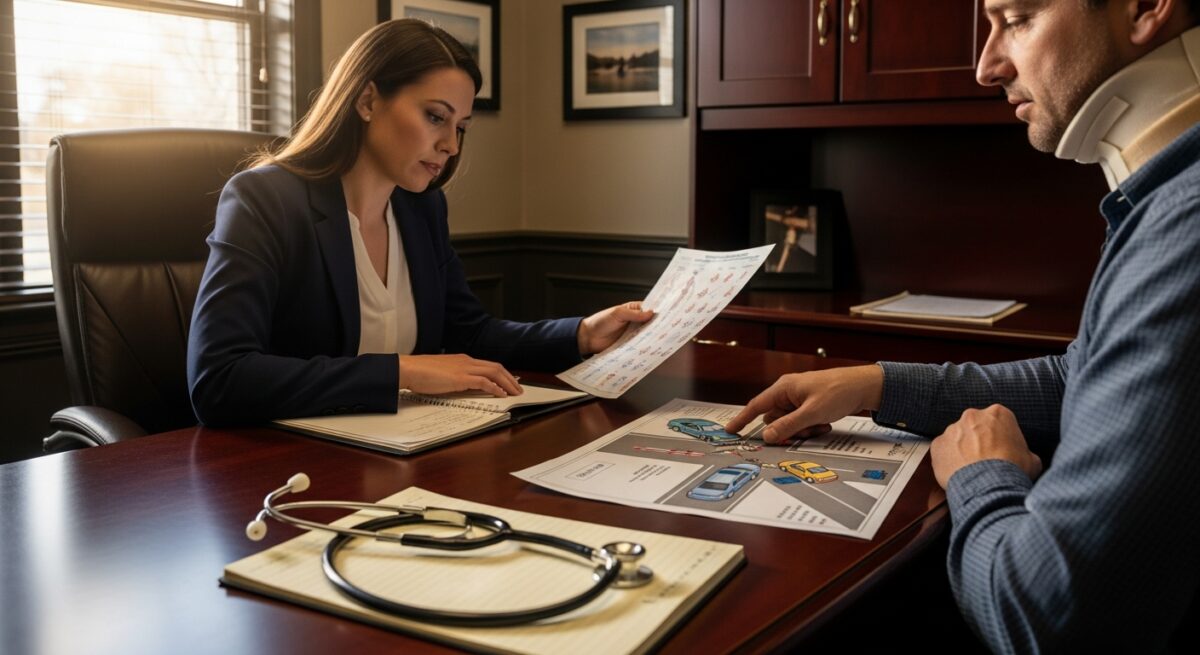Personal Injury Claim Without Lawyer: Steps to Win Your Case

Navigating personal injury claims can be challenging, particularly if you’re considering a personal injury claim without lawyer. These claims arise when someone suffers harm due to another’s negligence, covering incidents like car accidents, slip and falls, medical malpractice, workplace injuries, and product liability. Understanding your claim is crucial, as it affects your ability to receive fair compensation.
Understanding Personal Injury Claims
The Process of Filing a Personal Injury Claim Without a Lawyer
Filing a claim involves several steps:
- Gather Evidence: Collect medical records, accident reports, and witness statements.
- Document Your Injuries: Keep detailed records of your injuries and related expenses.
- Determine Liability: Identify who is at fault for your injuries.
- File Your Claim: Submit your claim to the appropriate insurance company or court, adhering to deadlines.
- Negotiate a Settlement: Evaluate and negotiate any settlement offers carefully.
Pros and Cons of Handling a Claim Without a Lawyer
Pros: Cost savings and control over your case. Cons: Complexity of the legal process and challenges in negotiation. In conclusion, while you can pursue a personal injury claim without a lawyer, being informed and prepared is essential for a successful outcome.
Types of Personal Injury Claims
Navigating personal injury claims can be challenging, especially if you’re considering a personal injury claim without a lawyer. Understanding the various types of claims is essential for determining the best course of action. Whether you’ve been in a car accident, suffered a slip and fall, or experienced medical malpractice, knowing your options can empower you to seek compensation.
There are several categories of personal injury claims, each with unique requirements. Here are some common types:
Car Accidents
- Car accidents are prevalent, with around 4.8 million injuries reported in the U.S. in 2020. You can file a claim without a lawyer if you have the necessary documentation, such as police reports and medical records.
Slip and Fall Cases
- These occur due to unsafe conditions on someone else’s property, leading to over 8 million emergency room visits annually. You can gather evidence like photographs and witness statements to support your claim without a lawyer.
Medical Malpractice
- Claims arise when healthcare professionals fail to provide adequate care, with medical errors being a leading cause of death. You can pursue a claim without a lawyer by collecting medical records and expert opinions.
Product Liability
- These claims involve injuries from defective products, with over 400,000 injuries reported in 2021. Documenting the defect can help you file a claim without legal assistance.
Steps to File a Personal Injury Claim Without a Lawyer
Filing a personal injury claim without a lawyer can be challenging, but many individuals manage to do it successfully. Understanding the steps involved is essential for saving time and money. Whether due to a car accident or a slip and fall, knowing how to file a claim empowers you to seek compensation.
1. Gather Evidence
- Document the Incident: Take photos of the scene and your injuries.
- Collect Witness Information: Gather names and contact details of witnesses.
- Obtain Medical Records: Keep all related medical records and bills.
Having solid evidence strengthens your case.
2. Understand the Law
- Know Your Rights: Familiarize yourself with state laws on personal injury claims.
- Research Compensation Types: Understand the damages you can claim.
3. File Your Claim
- Prepare Your Claim: Write a detailed letter to the insurance company.
- Submit Your Claim: Send it and keep copies for your records.
- Follow Up: Ensure your claim is being processed.
4. Negotiate a Settlement
- Be Prepared to Negotiate: Justify your requested amount with evidence.
- Stay Professional: Maintain constructive communication.
5. Know When to Seek Help
- Recognize Complex Cases: Consider hiring a lawyer if necessary.
- Evaluate Your Comfort Level: Seek legal advice if overwhelmed.
Knowing when to seek help is crucial for navigating complex situations.
Gathering Evidence for Your Claim
When pursuing a personal injury claim without a lawyer, gathering solid evidence is essential. The strength of your claim relies on the quality and quantity of the evidence you present, which supports your version of events and establishes liability and injury extent.
Importance of Evidence in Personal Injury Claims
Evidence is the backbone of any personal injury claim. Without it, your case may lack the necessary support to convince insurance companies or courts. Key types of evidence include:
- Medical Records: Keep all medical records, bills, and treatment notes.
- Accident Reports: Obtain police or incident reports from the accident scene.
- Witness Statements: Collect contact information and statements from witnesses.
- Photographic Evidence: Take photos of the scene, injuries, and property damage.
Steps to Gather Evidence
- Document Everything: Write down your recollections of the event.
- Collect Medical Documentation: Request copies of relevant medical documents.
- Reach Out to Witnesses: Ask for their contact information and statements.
- Take Photos: Capture images of the scene and injuries.
- Organize Your Evidence: Keep everything organized for easy access.
Statistics to Consider
Nearly 95% of personal injury cases settle before trial, highlighting the importance of strong evidence for effective negotiation.
Negotiating with Insurance Companies
When pursuing a personal injury claim without a lawyer, negotiating with insurance companies is crucial. Many believe they can manage their claims independently, but the complexities of these negotiations can be daunting. Effective communication can significantly influence the outcome and ensure fair compensation for injuries.
Understanding Insurance Companies’ Tactics
Insurance companies often employ tactics to minimize payouts, including:
- Lowball Offers: Initial offers are usually much lower than deserved.
- Delaying Tactics: Insurers may delay responses to wear you down.
- Claim Denials: Claims can be denied based on technicalities.
Recognizing these tactics helps in preparing your negotiation strategy.
Preparing for Negotiation
Gather necessary documentation to support your claim:
- Medical Records: Document all injuries and treatments.
- Accident Reports: Obtain police reports.
- Witness Statements: Collect statements from witnesses.
Making Your Case
During negotiations, remember to:
- Be Clear and Concise: State your case and desired compensation.
- Use Evidence: Present your documentation.
- Stay Professional: Maintain a calm demeanor.
Statistics show that well-prepared individuals can achieve settlements 40% higher than those who accept initial offers without negotiation.
Common Mistakes to Avoid
Navigating a personal injury claim without a lawyer can be challenging. While many believe handling claims independently will save money, this approach can lead to costly mistakes. Understanding common pitfalls is essential for maximizing compensation and streamlining the process.
When pursuing a personal injury claim without legal assistance, be aware of these key missteps:
Not Documenting Everything
- Failing to gather evidence: Collect all relevant information, such as photographs, medical records, and witness statements. Without proper documentation, your claim may lack support.
- Ignoring medical treatment: Seek medical attention immediately after an injury. Delaying treatment can worsen your condition and weaken your claim.
Underestimating the Value of Your Claim
- Not calculating all damages: Consider all costs, including lost wages and pain and suffering, to present a comprehensive claim.
- Accepting the first offer: Insurance companies often make low initial offers. Evaluate your injuries and negotiate for a fair settlement.
Missing Deadlines
- Ignoring the statute of limitations: Be aware of your state’s time limits for filing claims to avoid losing your right to compensation.
When to Consider Hiring a Lawyer
Navigating personal injury claims can be challenging, especially if you’re considering a personal injury claim without a lawyer. While it’s possible to manage your claim independently, there are circumstances where hiring a lawyer is advantageous. Understanding when to seek legal help can significantly impact your case’s outcome.
Complexity of Your Case
- Severe injuries or cases involving multiple parties can complicate the legal process.
- Medical malpractice or significant property damage often requires specialized legal knowledge.
- Insurance companies may use aggressive tactics that are hard to navigate without legal expertise.
In complex cases, a lawyer can help protect your rights and ensure fair compensation.
Negotiation Skills
- Lawyers are skilled negotiators familiar with settlement discussions.
- They can help you avoid lowball offers from insurance companies.
- A lawyer can provide insights into what constitutes a fair settlement based on similar cases.
If negotiating feels daunting, hiring a lawyer can help you secure what you deserve.
Time and Resources
- Managing a claim can be time-consuming, especially during recovery.
- A lawyer can handle paperwork and communication with insurers, allowing you to focus on healing.
- Statistics indicate that those who hire lawyers often receive higher settlements.
If you’re overwhelmed or lack time, consider seeking legal representation.
FAQs: Personal Injury Claim Without Lawyer
Q: How do I file a personal injury claim without a lawyer?
A: Start by gathering evidence, documenting your injuries and expenses, notifying the at-fault party’s insurance company, and submitting a demand letter outlining your damages.
Q: Can I claim compensation by myself?
A: Yes, you can file and negotiate a personal injury claim on your own, but it requires time, research, and strong negotiation skills.
Q: Can I settle without my lawyer?
A: Yes, if you haven’t hired one, you can settle directly with the insurance company. Just be cautious not to accept less than your case is worth.
Q: Can I settle my own personal injury case?
A: Absolutely. Many people settle minor claims themselves, but for serious injuries or disputes, legal guidance is often recommended.
Final Thoughts
Handling a personal injury claim without a lawyer is possible, especially for smaller cases. Be thorough, know your rights, and don’t rush into a settlement. If the case gets complex, consulting a legal expert can help protect your outcome.
Let a legal expert look at your case—get started free at LegalCaseReview.com or call 📞 (833) 279-1850.



